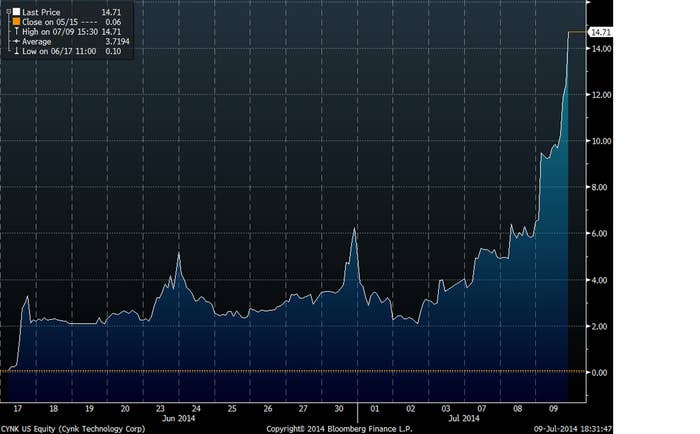
Cynk Technology, an unknown social networking "referral service for introductions" whose stock has gained more than 24,000% over the course of a few weeks, traces its origins back to a Las Vegas event promoter named Kenneth Carter, who told BuzzFeed his original ambition was to make money connecting Jay Z and Lady Gaga to their fans.
Carter, or Kenny Blaque as he is professionally known, is listed on a public securities filing from January 2012 as the sole officer and director of Introbuzz, described as a service for celebrities to interact with their fans. Introbuzz was the precursor to Cynk, whose meteoric share price rise – from around 10 cents to $14.71 at the close of trading Wednesday – remains a mystery to both the financial world and even the company's own former auditor. The only evidence of Cynk's service is the website introbiz.com.
According to a November 2013 filing with the U.S. Securities and Exchange Commission, Cynk had a net loss of just under $1.5 million through last September and has lost a total of $1.58 million since it began operations in May 2008. The filing lists no assets and says the company "has not yet emerged from its development stage, has not established an ongoing source of revenues sufficient to cover its operating cost."
Yet the company has raised $60,300 from issuing stock, and now has 291 million shares worth around $5.9 billion based on the price today of $20.19. (The company's tiny number of traded shares mean there's not actually anywhere near that much money at stake.)
A rampage of tweets from mid-June advertising how fast Cynk's stock was rising caught the attention of the financial blog Zero Hedge and quickly turned Cynk into a one-stop punchline for internet companies whose stock price far outweighs their fundamental value.
In an exclusive interview with BuzzFeed, Carter, who is no longer affiliated with Cynk, recounted the company's strange origin story.
Cynk's stock rose from under 10 cents to $14.71 yesterday in a few weeks, a gain of more than 24,000%.

Carter said he created a software product that would let celebrities interact with their fans for a fee and partnered with John Kueber, a Seattle-based publisher and entrepreneur, who owned a company called Introbuzz. As part of their deal, Kueber sold 6 million shares that Introbuzz issued to him in 2008 — the company's entire share base at the time — to Carter for $600. The price of the stock, which would trade in the over the counter markets, far away from any established stock exchange, was listed at 5 cents.
"I created some serious software," said Carter.
Carter said he had made contacts with major artists like Jay Z and Lady Gaga and was looking to raise about $120,000 for his venture. "We believe that people will pay for introductions that are meaningful since it can save or create significant value to someone's life," the company said in the 2012 filing. "Introbuzz plans to provide a natural platform to enable celebrities to raise money for causes in a seamless, meaningful and hassle-free way." The filing went on to list examples such as "a celebrity pop singer [offering] feedback on an aspiring music stars' new song."
But, in a letter sent to Carter, the SEC said that "references to recording artists and contacts in the sports and entertainment industry in Mr. Kenneth Carter's management biography appear promotional in nature and irrelevant to Mr. Carter's experience, qualifications, attributes or skills as an officer of Introbuzz."
Kuebler declined to answer questions when reached by BuzzFeed by phone Wednesday and instead asked for the questions in an email. He did not respond to the email. His LinkedIn page does not mention Introbuzz, but does refer to him founding "several successful technology businesses" along with "several other ventures that are blemishes on an otherwise decent record."
For more than a year, the company's only employee was Kenneth Carter, an event promoter and marketer in Vegas.

Introbuzz initially filed to sell 2 million shares of common stock in January 2012. But it ended up selling only 1 million shares priced at 5 cents per share for a total raise of $54,300 in August of that year. At the time, the company said it had "over 30" investors.
In a filing dated March 8, 2013, Introbuzz said that Carter had resigned from the company. His 6 million shares were canceled, and he told BuzzFeed that he has not received any money from his affiliation with Introbuzz. When asked to describe the specifics of his departure from the company, Carter declined to comment saying he needed to consult with his attorney.
On April 17, Marlon Luis Sanchez was elected to the board of directors and on April 18, he took over the company as CEO, with a stock option grant of 2.8 million shares to boot.
Sanchez quickly set about rebranding Introbuzz as Cynk. On June 5, 2013, the company announced a 75-1 stock split of its common shares, with Sanchez controlling 72.4%. His 2.8 million shares immediately turned into 210 million. The split went into effect a month later. The company changed its name and stock ticker symbol to Cynk on July 23.
It described itself as both a social networking service that would be a "referral service for introductions" and as a way for people to monetize their social networks. One example given to illustrate its use imagines an IT purchaser for a large corporation like Starbucks selling social connections and appointments.
Sanchez was listed as the company's only employee, holding the titles of president, chief executive officer, chief financial officer, chief accounting officer, secretary, treasurer, and sole director on its board. The filing announcing his appointment said he worked as a spokesman for the Tijuana medical tourism industry and a San Diego-area medical clinic.
BuzzFeed called two phone numbers listed for Sanchez; one was out of service and Sanchez did not return a message left on the other. Sanchez told the Wall Street Journal, "I am no longer associated with this company in any way, shape or form." A document from the company's lawyer says that Javier Moreno took over the company in February and owns 210 million shares, which he bought from Sanchez. Moreno lives in Belize City, Belize, and is the company's sole director and executive officer, according to the letter. The letter is dated June 11. Six days later, the company's stock saw its first real surge in trading, with 367,000 shares changing hands while the price rose from 18 cents to $4.25. Before June 17, the most shares that had been traded was 1,900 on May 15, with most days seeing no trading.
Cynk listed Belize City, Belize, as the address of its executive offices when it last filed quarterly financial results on Nov. 8. It also said at the time that it had the authority to issue another 500 million shares in addition to its 291 million. Five months later, Cynk told the SEC that it would no longer file financial reports. As of today, the company is "worth" almost $6 billion.
The share price run-up started about three weeks ago with a barrage of Twitter accounts tweeting out near-identical messages about how Cynk's stock was surging by hundreds and thousands of percentage points. The ticker quickly spread on Twitter, where traders who ride the extreme up-and-downs of the penny-stock market saw an opportunity to make quick profits by buying and quickly selling the stock as its rise continued. Often when a penny stock surges like this, the owners who bought in high are left holding the bag and face large losses.
None of it is going to Carter, however. He said he is still working on a social, celebrity-focused software product aimed at musicians and their fans. When asked who specifically he has met with at music labels to discuss this project, Carter would only say, "I don't want to mention the names until we do our deal, I was dealing with the heavyweights, the owners."
He said that he just needs $25,000 to get his latest project off the ground.
"If you can find me an investor, you don't have to worry about money for the rest of your life," Carter said.
On June 17, a set of very similar tweets started pointing out Cynk's surge:
$CYNK 1.45 +705% 226k surging higher #pennystocks #stocks
$CYNK 1.45 +705% 226k surging higher #pennystocks #stocks
$CYNK 1.45 +705% 226k surging higher #pennystocks #stocks
$CYNK 1.45 +705% 226k surging higher #pennystocks #stocks
$CYNK 1.45 +705% 226k surging higher #pennystocks #stocks
Leading to an obvious question:
$cynk who's pumping this?
@SEC_News You guys need to investigate the pump in $CYNK... looks like a total scam
This piece has been updated with more details about Cynk's current management and historical trading volume.
